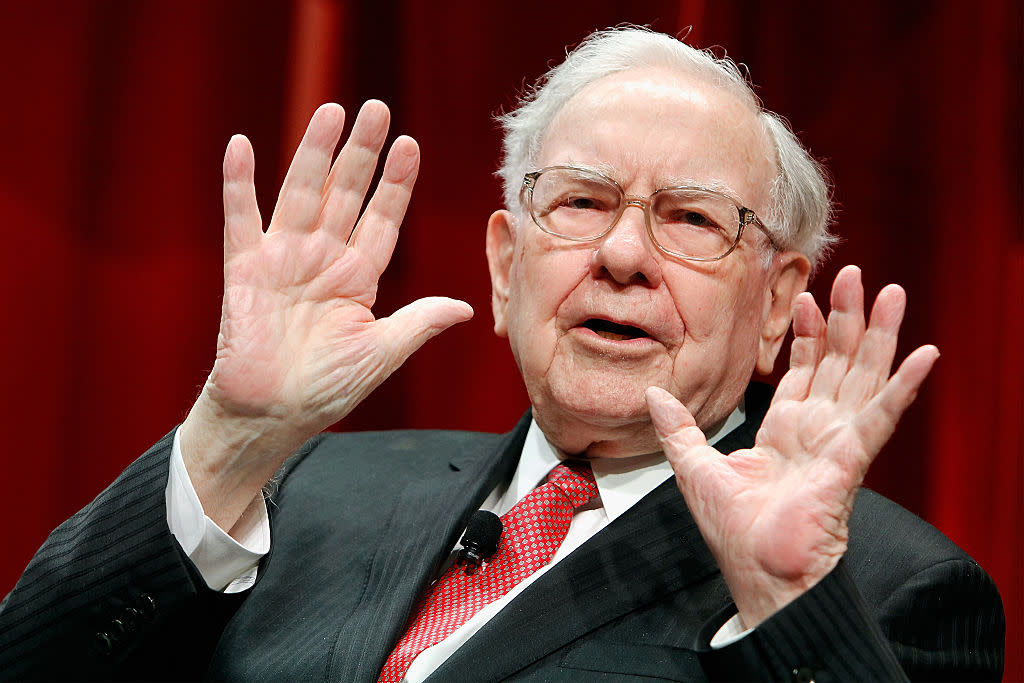"Fancy being Warren Buffett? Then worry about the future and not the past" says analyst Chris Bailey

(Photo by Paul Morigi/Getty Images for Fortune/Time Inc)
‘Accounting does not make corporate earnings or balance sheets more volatile. Accounting just increases the transparency of volatility in earnings’ Diane Garnick
Anyone who fancies being the next Warren Buffett has had a busy week with a lot of corporate earnings disclosures.
In the London market alone large cap mining names such as BHP Billiton, Anglo American and Glencore have shared their thoughts whilst in the banking sector a long list including HSBC, Lloyds, Barclays, RBS and Standard Chartered have dumped a bunch of new insights on an unsuspecting population.
Now corporate earnings – along with the associated dividend pronouncements – do matter because they reflect the fundamental or ‘real’ part of the stock market valuation game.
It is a fair bet that over time a company that increases one (or both) of its earnings or dividends in a sustainable manner will be rewarded by a higher share price irrespective of the nuances of the local or global economy.
Of course corporate earnings disclosures in the shorter-term are only ever part of the answer as stock markets and corporate earnings growth are never well correlated as any neophyte investor learns quickly enough as they scratch their head when a share price falls after ‘record profits’ or a sharp increase in profits. This is because investment is a game of expectations management.
Take the mining stocks that reported. Anglo American in particularly exceeded hopes, hinting they will pay a dividend again soon and saying that some of the mining operations they thought they would have to sell no longer need to be on the block. Meanwhile the world’s largest mining company – BHP Billiton – raised their dividend and told the world how great their range of assets in areas like iron ore and copper were.
[graphiq id=”5MldUn9e817″ title=”Bhp Billiton Sp Adr (BHP) Stock Price – Since the Election” width=”600″ height=”459″ url=”https://sw.graphiq.com/w/5MldUn9e817″ link=”http://stock-screener.findthecompany.com/l/1100/BHP” link_text=”FindTheCompany | Graphiq” frozen=”true”]
But the records will state that both shares fell back in the days after these results were published. In the wider scheme of things these falls were irrelevant versus the massive share price romp the shares of both companies have enjoyed over the last year…at a time of generally great uncertainty about their businesses and actual results which were typically shocking and replete with red ink.
This is always the way with investments: what matters today is not what impacts the stock markets which are forward looking and trying to discount the future.
The share price romp of mining stocks over the last year told you that investors were too pessimistic about prospects despite a litany of big losses in actual reported numbers.
The share price decline in recent days tells you that investors are struggling to find the next big trick in mining shares despite a profits romp and the resumption/hiking of dividends.
As the old saying goes, it is easier to travel than arrive. Mining stocks are not uninteresting but the easier share price shifts have gone as expectations have caught up.
Now comes the harder work of pacing through minerals supply and demand and the underpinnings of how a company is set up.
The same goes for the other area that has seen a huge amount of reporting this week: the banks. Financial shares have also romped over the last year, especially in the thick end of eight months since the Brexit referendum vote.
[graphiq id=”2lqf2j6kgTP” title=”YouGov Poll: Hindsight on Brexit” width=”600″ height=”517″ url=”https://w.graphiq.com/w/2lqf2j6kgTP” link=”https://www.graphiq.com/vlp/2lqf2j6kgTP” link_text=”InsideGov | Graphiq” ]
Prior to this week, HSBC’s share price chart looked like that classic momentum case study effortlessly rising from the bottom left to the top right of the page.
The results earlier in the week were shabby at many levels from the impact of fines, to challenges in the private banking area and the influence of disposals of businesses in countries like Brazil. Unsurprisingly given the run up in the share price HSBC’s stock has had a poor week.
By contrast, Lloyds did everything right and the shares got marked up whilst the volatility in the Barclays share price indicates that investors do not really know what to think – which of course makes it the one to be really looking at if you have a firm view of prospects and a reasonable valuation.
Expectations for banks are – to coin a phrase – all over the place and for me this makes the space more interesting for investors than the generalised historic love-up of the miners.
The old rallying cry of ‘you have to invest looking forward’ has a huge amount of truth to it but once an investors works out that it is where you are going that really matters it helps you cut through the fuzz and excitable headlines and focus on what really matters. Just like Warren Buffett.
Chris Bailey has over 20 years of investment industry experience at long-only and long-short institutions as a global multi-asset fund manager, strategist/macro thinker and, in the earlier part of his career, as a securities and fund analyst.
In 2013 he founded Financial Orbit focusing on daily macroeconomic comment and securities analysis. In December 2016 his Twitter account (@financial_orbit) was named as one of the ’50 accounts investors should follow in 2017’.
Disclaimer: The content on this page does not constitute financial advice and is provided for general information purposes only. Nothing on this page should be regarded as an offer to conduct investment business or to buy/sell any investment.

 Yahoo News
Yahoo News 

